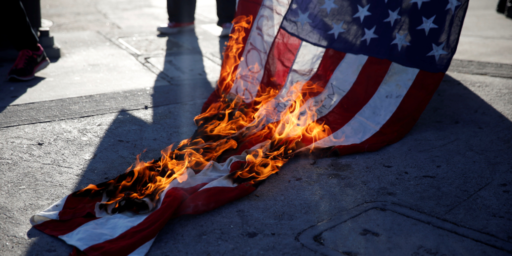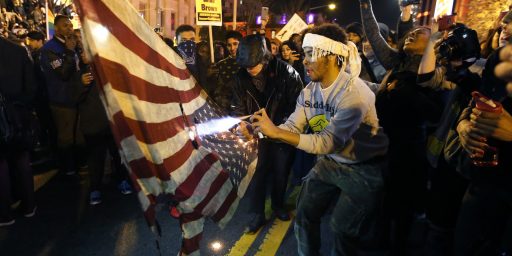Senate Rejects Flag Desecration Amendment
Americans remain free to engage in symbolic speech that most of us vehemently dislike.
A constitutional amendment to ban flag desecration died in a Senate cliffhanger Tuesday, a single vote short of the support needed to send it to the states for ratification and four months before voters elect a new Congress. The 66-34 tally in favor of the amendment was one less than the two-thirds required. The House surpassed that threshold last year, 286-130.
President Bush, who supports the amendment, called the failed vote unfortunate and commended Republicans and Democrats who voted to move the ratification process forward. In a statement, Bush said he continued to believe that “the American people deserve the opportunity to express their views on this important issue.”
The proposed amendment, sponsored by Sen. Orrin Hatch, R-Utah, read: “The Congress shall have power to prohibit the physical desecration of the flag of the United States.”
This is precisely why the Framers made amending the Constitution very, very difficult.





the flag is the symbol of our country.noone seems to care about desecrating the country , so why the symbol?
So, let me get this correct. It is illegal to talk disrepectfully to a police officer, who is a public servant but it is legal as protected freedom of speech to burn the flag of the United States of America? Would it be considered freedom of expression if the person burning the flag were terminated most violently while expressing their freedom to burn the flag? Seems to me that would just be freedom of expression, certainly not punishable under the protection of the first amendment.
ZR: No, murder isn’t speech. But speech is. The only reason people get worked up about a flag being burned is the MESSAGE it sends. It’s the content of the speech that people find offensive. Wearing a flag on one’s lapel or pasting one on the car to show patriotic pride? Good. Burning one to show contempt? Bad.
And expressing disrespect for public servants certainly shouldn’t be a crime, either.
There’s a major difference, though, even from a practical level between dissing the elected offical and dissing the concept of the country itself.
If this thing ever passes will we still be able to burn Confederate Flags?
Something tells me this wasn’t so much a cliffhanger as one where the votes were counted beforehand. None the less there are 66 unprincipled dumbasses in the Senate. But is that really news?
So, all of the other Amendments prior, including the First 10 (that would be the Bill of Rights), were put in place by ‘unprincipled dumbassess‘?
Meanwhile hippie desecration remains illegal.
I want to see some one fight for my right to pee on a stinky hippie…
I agree with James. We might be on different sides of the question on whether a flag burning ban is a good idea, but this is precisely how our political system is supposed to handle controversial issues. Just as those who supported allowing flag burning would have had the right to immediately start work on an amendment to allow flag burning, so to those in favor of the ban can begin the political process again. The barriers to passage are high and the should be high for an amendment.
I suspect that over the next 4.5 years we will find at least one person of the 34 who will pay a political price for that vote. Ironically, I think it is as likely to be one of the 3 republicans as it is one of the 31 democrats. I doubt any of the 66 yes votes will pay a political price on this vote, but I may be wrong. Note that political price is not that they lose an election, but that they lose a close election where the vote was a critical piece of the campaign against them.